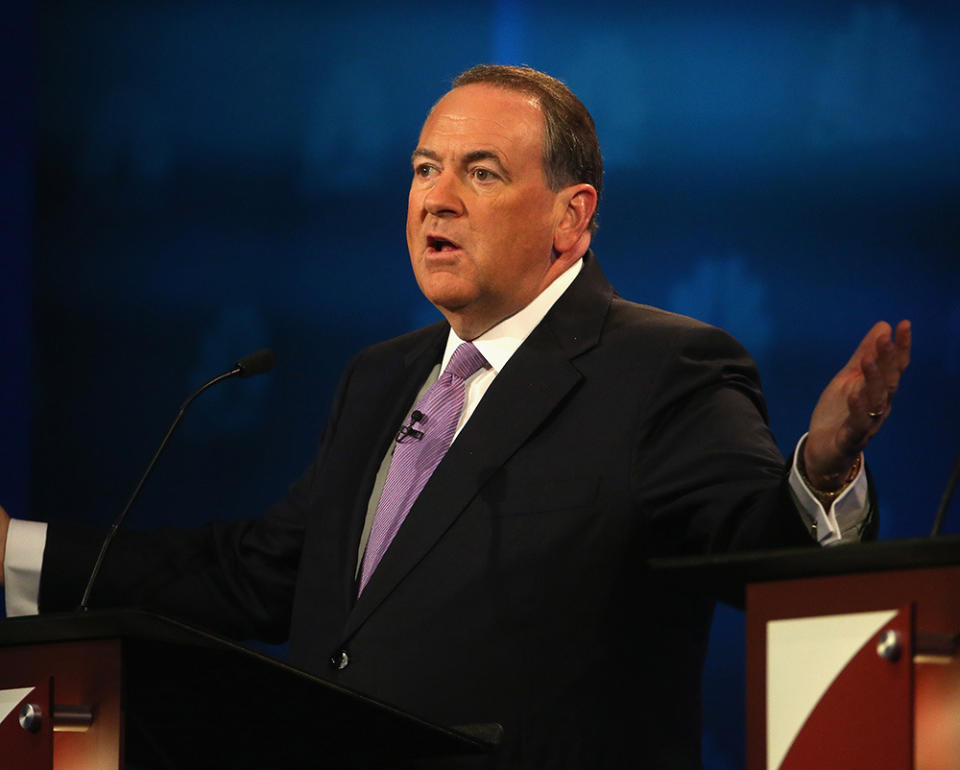5 Health Q’s That Need Answering After 3rd GOP Debate
When the 10 Republican candidates took the stage on Wednesday evening for a third debate, this time in Boulder, Colo., their conversation centered on the economy, and a few health issues were intrinsic to that discussion, including equal pay for women, Medicare and Medicaid, and preventive care. Ben Carson also fielded a question from the CNBC moderators on his personal finances, when they brought up his involvement with a shady supplement company. Here, the answers to a few questions piqued by the candidate’s discussions.
1. What exactly is Ben Carson’s relationship with supplement maker Mannatech? (And how could a neurosurgeon ever support a product that claims to “cure” an incurable degenerative neurological disorder?)

(AP Images)
As moderator Carl Quintanilla asked Dr. Ben Carson last night, “This is a company called Mannatech, a maker of nutritional supplements, with which you had a 10-year relationship. They offered claims they could cure autism, cancer, they paid $7 million to settle a marketing lawsuit in Texas, and yet your involvement continued. Why?”
And while Carson replied, “Well, that’s easy to answer. I didn’t have an involvement with them. That is total propaganda, and this is what happens in our society. Total propaganda” — the truth is somewhat more complicated.
In a 2004 speech to the Mannatech team, Carson shared that he saw many of the symptoms of his prostate cancer go away after he began taking Mannatech supplements.
An investigation launched by the Wall Street Journal earlier this month discloses the nuances of the situation. While the Carson campaign insists that Carson only gave paid speeches at Mannatech corporate events, the WSJ reports that a 2011 video shows Carson thanking Mannatech executives for the $2.5 million donation that allowed him to assume an endowed chair at Johns Hopkins Medicine in May 2008.
Concurrent to the creation of the Mannatech-funded endowed chair for Carson in pediatric neurosurgery, the supplement maker was also being prosecuted by Texas Attorney General Greg Abbott (now the state’s governor) for unlawful marketing practices, noting that the company claimed their product could cure autism, non-Hodkin’s lymphoma, and various cardiac conditions.
Related: Ben Carson Conducted Research on Fetal Tissue — and Defends It
Another Mannatech product, Abrotose, was shilled by the company with the insistence that it offered “a miracle cure that could fix a broad range of diseases, from cancer to multiple sclerosis and AIDS.”
Furthermore, in 2004, Mannatech faced an additional suit specifically involving the supplement’s claims to effectively offer treatment for Tay-Sachs disease, a genetically inherited degenerative neurological disorder that always results in death. A mother of a child with Tay-Sachs who used Mannatech products to treat her son went on to file suit against the company in Los Angeles Superior Court, claiming intentional infliction of emotional distress, negligent misrepresentation, and conspiracy to commit fraud. Not only are Mannatech supplements unable to “treat” Tay-Sachs disease, a condition for which there is no treatment, but, the plaintiff claimed, the Mannatech sales associate with whom her family had worked shared naked photos of her son at a Mannatech demonstration seminar as part of a presentation on the product’s effectiveness.
Yet despite all of this, Carson continued his relationship with the company. In March 2014, he went so far as to film a special for PBS on the power of “glyconutrients,” the core component of Mannatech’s widely debunked products.
In a statement to the National Review, Mannatech said that “Dr. Carson is not a spokesperson or endorser of Mannatech” — and yet the Mannatech site continued to promote Carson’s PBS special, which offered an indirect endorsement of its products, including the use of language seemingly lifted directly from Mannatech sales collateral.
Carson received $42,000 for the most recent speech he gave to Mannatech associates in 2013.
2. Why are Carly Fiorina and Ted Cruz reluctant to admit that women deserve equal pay for equal work?

(AP Images)
“Senator Cruz,” moderator Becky Quick posed, “working women in this country still earn just 77 percent of what men earn. And I know that you’ve said you’ve been very sympathetic to our cause. But you’ve also said that the Democrats’ moves to try and change this are political show votes. I just wonder what you would do as president to try and help in this cause?”
“The Democrats’ answer to everything is more governmental control over wages,” said Cruz, concluding that “big government benefits the wealthy, it benefits the lobbyists, it benefits the giant corporations. And the people who are getting hammered are small businesses, it’s single moms, it’s Hispanics. That is who I’m fighting for. The people that Washington leaves behind.”
Carly Fiorina then jumped in to add, “Becky, it is the height of hypocrisy for Mrs. Clinton to talk about being the first woman president, when every single policy she espouses, and every single policy of President Obama, has been demonstrably bad for women. … I am a conservative because I know our values, our principles, and our policies work better to lift everyone up, men and women.”
Related: The Psychology of Why Carly Fiorina Continues to Defend Planned Parenthood Claims
In April 2014, Cruz failed to cast a vote either way for the Paycheck Fairness Act, a bill that would ban employers from instructing employees not to discuss pay and reduce business justifications for gender pay gaps, before ultimately voting against it later that year, calling the bill “a trial lawyer bonanza.” Cruz went on to critique President Obama’s disassembling of the “gag order” on salary discussions for federal contractors, calling the measure a “distraction” from issues more critical to women.
According to a 2011 survey by the Institute for Women’s Policy Research, 48.4 percent of all workers in the U.S. are contractually banned or strongly discouraged from discussing their salaries with their colleagues. As Think Progress noted in a 2014 story, “Not having the ability to openly discuss your salary means that you’d have no idea if you were getting serially underpaid, and that’s exactly the case for Lilly Ledbetter, who will be joining the president when he makes the announcement of his executive actions. Ledbetter was a 19-year employee of Goodyear when someone slipped her a note that said she was earning thousands less than her male coworkers.”
As the National Women’s Law Center (NWLC) reported in an April 2015 fact sheet, the wage gap is even more dramatic for women of color. While it is accurate, as Quick noted, that Caucasian women are paid between 77 and 78 cents on the dollar compared to their male counterparts, African-American women are paid only 64 cents on the dollar and Latinas 56 cents on the dollar compared to white, non-Hispanic men.
The wage gap most significantly hurts minority women in low-wage jobs, as African-American women represent 11.6 percent and Latinas represent 15 percent of the low-wage workforce; African-American women represent just 6.1 percent of the total workforce, with Latinas representing 6.6 percent.
Furthermore, the NWLC notes that the wage gap discriminates even more strongly against single moms in communities of color, as African-American women and Latinas are more likely than white, non-Hispanic women to be heads of households. While median family income for married couples with children in 2013 was $84,916, median family income for female-headed households was just $26,148. The NWLC also suggests that the wage gap may make it more difficult for women of color to move upward through the middle class, as only 26 percent of minority women live in families considered to be upper middle class, or earning $58,000 or more annually, while 40 percent of minority men, 46 percent of white women, and 60 percent of white men are classified as such.
The wage gap for white, non-Hispanic women earning 78 cents on the dollar that men earn translates to $10,876 less of pay per year in median earnings, compared to men. Thus, based on this figure, a woman who worked full time, year-round would lose approximately $435,049 in wages over a 40-year career.
3. Does Mike Huckabee know that fetal tissue is a critical part of preventive care?

(Getty Images)
In one of his strongest moments of the evening, former Arkansas Gov. Mike Huckabee asked Quick, “Why aren’t we talking about — instead of cutting benefits for old people, cutting benefits for sick people — why don’t we say, ‘Let’s cure the four big cost-driving diseases: diabetes, heart disease, cancer, and Alzheimer’s.’ If you do that, you don’t just change the economy, you transform the lives of millions of hurting Americans. Gosh, I’d love for us to talk about something like that.”
Interestingly, however, Huckabee seems to have forgotten that he has often talked about standing against such measures each and every time he has spoken out against Planned Parenthood and the practice of fetal tissue donation and research.
Huckabee told Fox News’s Sean Hannity in August, “Terrorists cut people’s heads off, and that’s what they do in the Planned Parenthood clinics. Civilized people don’t hack other people to death and then sell the parts because there is money to be made.”
Related: Doctors ‘Horrified’ by Republican Candidates’ Outlook on Vaccines
But the practice of fetal tissue donation in abortion care has fueled the research that will find a cure for Alzheimer’s, Parkinson’s, and many forms of cancer.
It is because of fetal tissue research that the polio vaccine exists today — and that polio has been all but eradicated in the United States, thought of as perhaps the greatest public health achievement of the past century.
Furthermore, the American Society for Cell Biology has noted that these kinds of medical breakthroughs simply cannot happen without fetal tissue research. And while fetal tissue can occasionally be collected through miscarriages, it is more available as a result of abortion.
4. Does John Kasich, and his fellow candidates, know what actually happened after he expanded Medicaid in his state?

(AP Images)
Gov. John Kasich of Ohio made frequent mention of Medicaid — and criticized the approach of so many of his fellow candidates regarding the elimination or dramatic reduction of Medicaid and Medicare.
But he also boasted about taking Medicaid growth in his state from 10 percent to 2.5 percent during his tenure through the use of “competition” and “technology.”
Did Kasich forget how much good came to his state after he went up against the Republican establishment and opted in to Medicaid expansion in his state under the Affordable Care Act (ACA, know colloquially as Obamacare) in 2012?
Medicaid expansion, one of the central components of the ACA, resulted in the adult uninsured rate in Ohio to drop from 16 percent to 8.7 percent and for children’s uninsured rates to drop from 4.7 percent to 2 percent.
As a 2013 report from the Robert Wood Johnson Foundation summarized, “In each state where relatively comprehensive analyses of costs and financial gains were conducted, the net result showed that, on balance, Medicaid expansion would yield state fiscal advantages.”
Furthermore, as a 2014 article in the preeminent public health journal Health Affairs noted, “Because the federal government will pay 100 percent of increased costs associated with Medicaid expansion for the first three years (and 90 percent thereafter), opt-out states are also turning down billions of dollars of potential revenue, which might strengthen their local economy.” Additionally, Medicaid expansion is associated with a 6.1 decrease in mortality nationwide.
5. Oh, yeah, and is Jeb Bush really 7-0 in his fantasy football league?

As one Twitter user put it last night: “Questions about fantasy football: 1; Questions about paid family leave: 0.”

